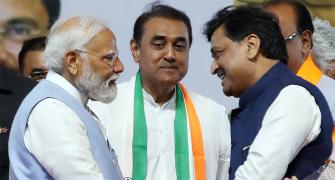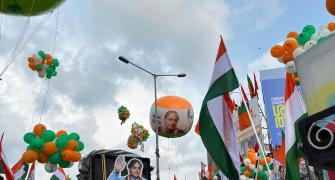A study by the Reserve Bank of India's department of economic analysis and policy on foreign exchange reserves has debunked the myth that the surge in India's foreign exchange reserves is the outcome of Non-Resident Indians pouring money into the country to take advantage of India's higher interest rates.
The study said that the interest rate offered on non-resident foreign currency accounts -- FCNR(B) -- is 25 basis points lower than the London inter-bank offered rate (Libor), while the interest rates offered on non-resident Indian convertible rupee deposits (NRE deposits) range from 4.5 to 6 per cent.
Hence, the interest rate differential -- the rate offered by NRE deposits and instruments in the US market -- is about 3-4 per cent.
The study points out that there has been a net increase of $2.1 billion in NRI deposits during April-November 2002, similar to the increase of $2.2 billion in April-November 2001.
The inflows through NRI deposits in the current fiscal have been consistent with the trends observed over the past few years.
There is, thus, no evidence to show that available arbitrage opportunities have caused the accretion to foreign exchange reserves, it said.
Analysing the cost of reserves, the study said a substantial portion of the fresh accretion has been by way of current account surplus (20 per cent), non-debt creating capital flows (40 per cent) and by way of currency valuation (17 per cent).
The balance (23 per cent) which has come by way of debt creating capital inflows, includes non-resident deposits, 'other assets' under banking capital and short-term loans.
Since the debt creating inflows are significantly low, the cost of accretion to reserves is not very significant, it pointed out.
Furthermore, almost the entire addition to reserves, in the last few years, has been made without increasing the overall level of external debt.
The net earnings foreign exchange reserves during the year ended June 30, 2002, worked out to 4.1 per cent.
This excludes valuation changes on account of exchange rate movements between rupee and foreign currencies in which foreign exchange reserves are held and gains/losses on account of movement in prices of gold.
In other words, the return of 4.1 per cent on reserves is exclusive of the substantial gains accrued in dollar terms to foreign exchange reserves portfolio on account of appreciation of non-dollar currencies against the US dollar and gains from the rise in price of gold during the year.







